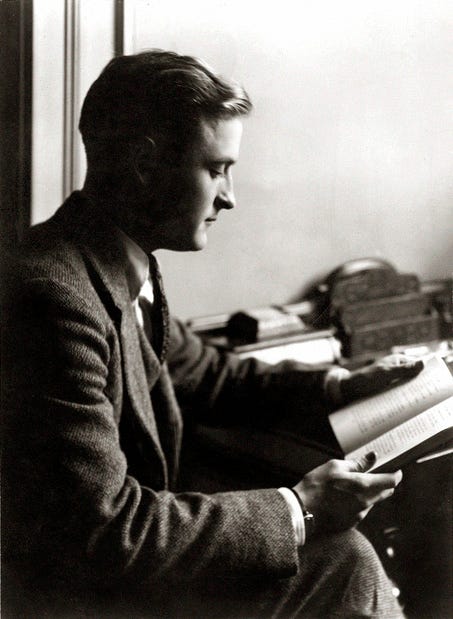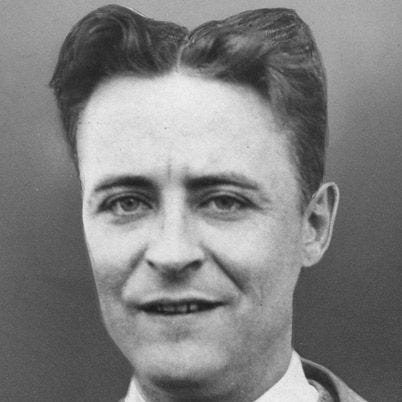Writing Tips from F. Scott Fitzgerald
"Great books write themselves, only bad books have to be written."
You don't write because you want to say something, you write because you have something to say. -F. Scott Fitzgerald
Fitzgerald (1896-1940), born in Minnesota, dropped out of school in 1917 to fight in WWI. He grew up mostly in New York state and attended Princeton University. During his lifetime, he published 4 novels (including The Great Gatsby & Tender is the Night), 4 story collections, and 164 short stories.
After his death, his friend literary critic Edmund Wilson edited and published a fifth unfinished novel, The Last Tycoon (1941).
In addition to memorable poetic prose, rich imagery, and recognizable characters, Fitzgerald often uses compound-complex sentences that themselves give a taste of the action (or lack thereof). Here is an example from the The Great Gatsby:
“He put his hands in his coat pockets and turned back eagerly to his scrutiny of the house, as though my presence marred the sacredness of the vigil. So I walked away and left him standing there in the moonlight--watching over nothing.”
Although his work was very popular in the 1920s, his true genius was increasingly recognized as time passed. Today he’s considered one of the greatest American 20th century writers.
But, try as he might, he was not successful at transposing his skill to write for the big screen. Writing screenplays is a different skill that requires fewer, simpler, and more condensed lines.
Here are 10 tried and true writing tips in Fitzgerald’s own words.
Writing Tips for the Ages
“My whole theory of writing I can sum up in one sentence. An author ought to write for the youth of his own generation, the critics of the next, and the schoolmasters of ever afterward.” F. Scott Fitzgerald to the Booksellers’ Convention, 1920, Letters, pp. 477-78
“Don’t be a bit discouraged about your story not being tops. At the same time, I am not going to encourage you about it, because, after all, if you want to get into the big time, you have to have your own fences to jump and learn from experience. Nobody ever became a writer just by wanting to be one. If you have anything to say, anything you feel nobody has ever said before, you have got to feel it so desperately that you will find some way to say it that nobody has ever found before, so that the thing you have to say and the way of saying it blend as one matter—as indissolubly as if they were conceived together.” 1936, Letters, p. 23
“Novels are not written, or at least begun, with the idea of making an ultimate philosophical system—you tried to atone for your lack of confidence by a lack of humility before the form.” to John Peale Bishop, 1929, Letters, p. 386
“Someone once said—and I am quoting most inexactly, ‘A writer who manages to look a little more deeply into his own soul or the soul of others, finding there, through his gift, things that no other man has ever seen or dared to say, has increased the range of human life.’ ”
“That is why a young writer (and I shrink at the word as much as you do) is tempted, when he comes to the crossroads of what to say and not to say as regards character and feeling, to be guided by the known, the admired and the currently accepted as he hears a voice whisper within himself, ‘Nobody would be interested in this feeling I have, this unimportant action–therefore it must be peculiar to me, it must not be universal nor generally interesting nor even right.’
“But if the man’s gift is deep or luck is with him. . .some other voice in that crossroads makes him write down those apparently exceptional and unimportant things and that and nothing else is his style, his personality eventually his whole self as an artist. What he has thought to throw away or, only too often, what he has thrown away, was the saving grace vouchsafed him.
“Gertrude Stein was trying to express a similar thought when-speaking of life rather than letters- she said that we struggle against most of our exceptional qualities until we’re about forty and then, too late, find out that they compose the real us. They were the most intimate self which we should have cherished and nourished.
“Again, the above is inexact and all that I have said might lead you astray in the sense that it has led Saroyan astray and the late Tom Wolfe in imagining that writing should be a cultivation of every stray weed found in the garden. [!] That is where talent comes in to distinguish between the standard blooms which everyone knows and are not particularly exciting, the riotous and deceitful weeds, and that tiny faint often imperceptible flower hidden in a corner which, cultivated à la Burbank, is all it will ever pay us to cultivate whether it stays small of grows to the size of an oak.” to Morton Kroll, 1939, Letters, pp. 616-17
“All fine prose is based on the verbs carrying the sentences. They make sentences move. Probably the finest technical poem in English is Keats’ Eve of Saint Agnes [1819]. A line like The hare limped trembling through the frozen grass, is so alive that you race through it, scarcely noticing it, yet it has colored the whole poem with its movement- the limping, trembling and freezing is going on before your own eyes.” 1938, Letters, p. 43.
“Poetry is either something that lives like fire inside you like music to the musician or Marxism to the Communist or else it is nothing, an empty, formalized bore around which pedants can endlessly drone their notes and explanations.
“The Grecian Urn [by John Keats, 1819] is unbearably beautiful with every syllable as inevitable as the notes in Beethoven’s 9th Symphony or it’s just something you don’t understand. It is what it is because an extraordinary genius paused at that point in history and touched it. I suppose I’ve read it 100 times. About the 10th time I began to know what it was about, and caught the chime in it and the exquisite inner mechanics. Likewise with The Nightingale [by Hans Christian Andersen, 1843] which I can never read through without tears in my eyes….
“Knowing those things very young and granted an ear, one could scarcely ever afterwards be unable to distinguish between gold and dross in what one read. In themselves those eight poems are a scale of workmanship for anybody who wants to know truly about words, their most utter value for evocation, persuasion or charm. For awhile after you quit Keats all other poetry seems to be only whistling or humming.” 1940, Letters, pp. 105-6
“Mostly, we authors must repeat ourselves—that’s the truth. We have two or three great and moving experiences in our lives experiences so great and moving that it doesn’t seem at the time that anyone else has been so caught up and pounded and dazzled and astonished and beaten and broken and rescued and illuminated and rewarded and humbled in just that way ever before. Then we learn our trade, well or less well, and we tell our two or three stories each time in a new disguise—maybe 10 times, maybe 100, as long as people will listen.” Afternoon of an Author, p. 132
“…the odds are against your having the type of talent that matures very quickly most of my contemporaries did not get started at 22. . .The talent that matures early is usually of the poetic [type], which mine was in large part. The prose talent depends on other factors- assimilation of material and careful selection of it, or more bluntly: having something to say and an interesting, highly developed way of saying it.” 1940, Letters, p. 102
“You must begin by making notes…Put it down when you think of it. You may never recapture it quite as vividly the second time.” Letter to Sheilah Graham, 1940, Beloved Infidel, p. 23
The Incredible Real Life Story of St. Patrick
HAPPY ST. PATRICK’S DAY to everyone with a drop of Irish blood, like me! (being 100% Mexican includes many nations), and equally to the non-Irish, like St. Patrick himself! The patron saint of Ireland, Maewyn Succat, was born at the end of the 4th century in Wales or Scotland. Dubbed “father figure” or Patrick, he was never officially canonized, (the …








